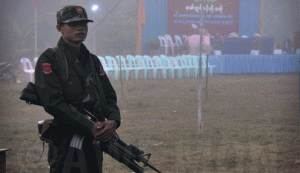By LAWI WENG - The New Mon State Party (NMSP), an ethnic armed group in southern Burma, has repeatedly asked the new Burmese government to stop fighting in Shan State, with the threat that a civil war will spread throughout Burma.

An executive member of the NMSP, who wished to remain anonymous, said, “We have agreed among our party leaders to open a battle front. If we open this front, the fire of the civil war will spread throughout the country.
“It [the Burmese government] cannot stop the fire after we start. This is why we are asking [them] to stop fighting in Shan State.”
The Burmese government attacked the Shan State Army-North (SSA-N) in the middle of March lunching a major military offensive in the area. Fighting has continued since then.
SSA-N is a former ceasefire group, similar to the NMSP, though the SSA-N took part in a ceasefire agreement with the Burmese military junta in September 1989. SSA-N is also a member of the United Nationalities Federal Council (UNFC) along with the Kachin Independence Organization, the Karen National Union (KNU), the Karenni National Progressive Party, and the NMSP.
“We can not watch without action while one group faces attack,” said the source from the NMSP.
The junta has targeted the different armed ethnic groups who refused to join the Burmese government ruled Border Guard Force (BGF). The Burmese army first attacked Kokang, an armed ethnic group in northern Burma, in June 2009.
According to the decision from NMSP central and executive committee meetings held at NMSP headquarters in Bee Ree, Ye Township, in the first week of April, party leaders decided to defend themselves militarily against any Burmese military offensive that arrives in NMSP’s areas of control.
NMSP leaders believe that the Burmese army will start a military offensive in their area of control some day in the imminent future due to the end of the ceasefire agreement between the former Burmese government and the NMSP.
In 1995, the NMSP agreed to a ceasefire with the Burmese military junta, and for fifteen years both parties did not participate in political dialogue. The ceasefire agreement ended when the NMSP refused to become part of the BGF in April 2010.



